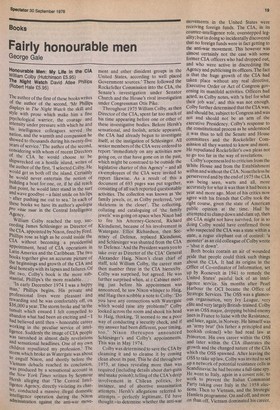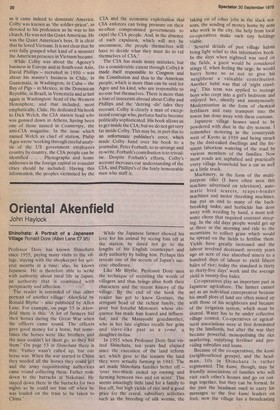Books
Fairly honourable men
George Gale
Honourable Men: My Life in the CIA William Colby (Hutchinson £5.95) The Night Watch David Atlee Phillips (Robert Hale £5.95) The author of the first of these books writes of the author of the second, 'Mr Phillips displays in The Night Watch the skill and Style with prose which make him a fine psychological warrior, the courage and intensity under pressure with which he and his. intelligence colleagues served the nation, and the warmth and compassion he Showed to thousands during his twenty-five years of service.' The author of the second, considering with whom of recent Directors of the CIA he would choose to be Shipwrecked on a hostile island, writes of the author of the first, 'I selected Colby. He would get us both off the island. Certainly he . would never entertain the notion of building a boat for one, or, if he did reach that point, he would later stand in the surf and wave goodbye — a faint smile on his lips — after pushing me out to sea.' In each of these books we have its author's apologia pro vitae suae in the Central Intelligence Agency.
William Colby reached the top, succeeding James Schlesinger as Director of the CIA, appointed by Nixon, fired by Ford. Phillips rose as high as he could inside the CIA without becoming a presidential aPPointment, head of CIA operations in Latin America and the Caribbean. The two books together give an accurate picture of the beginnings and growth of the CIA and deal honestly with its lapses and failures. Of the two, Colby's book is the more substantial, Phillips's the more readable. In early December 1974 I was a happy Man,' Phillips begins. His private and professional lives were pleasant and rewarding and he was comfortably off, on $36,000 a year. The storm broke and 'in the tumult which ensued I felt compelled to abandon what had been an exciting and — I had believed until then — honorable career working in the peculiar service of intelligence. Suddenly the image of CIA people was tarnished in almost daily revelations and sensational headlines. One of my own Children repudiated my profession.' The storm which broke as Watergate was about to engulf Nixon, and shortly before the Vietnam debacle reached its conclusion, was produced by a sensational account in the New York Times written by Seymour H. ersh alleging that 'The Central Intelligence Agency, directly violating its charter, Conducted conducted a massive illegal domestic intelligence operation during the Nixon administration against the anti-war move ment and other dissident groups in the United States, according to well placed Government sources.' There followed the Rockefeller Commission into the CIA, the Senate's investigation under Senator Church and the House's rival investigation under Congressman Otis Pike. Throughout 1975 William Colby, as then Director of the CIA, spent far too much of his time appearing before one or other of these investigative bodies. Before Hersh's sensational, and foolish, article appeared, the CIA had already begun to investigate itself, at the instigation of Schlesinger. All senior members of the CIA were ordered to report 'immediately on any activities now going on, or that have gone on in the past, which might be construed to be outside the legislative charter of this Agency' — and all ex-employees of the CIA were invited to report likewise. As a result of this a document of 693 pages was put together, consisting of all such reported questionable activities. The collection was known as 'the family jewels, or, as Colby preferred, 'our skeletons in the closet'. The collecting, collating and cataloguing of 'the family jewels' was going on apace when Nixon had to fire his Attorney-General, Richard Kleindienst, because of his involvement in Watergate. Elliot Richardson, then Secretary of Defence, replaced Kleindienst, and Schlesinger was shunted from the CIA to Defence .'And the President wants you to take over as Director of the CIA' General Alexander Haig, Nixon's clean chief of staff, told William Colby, the career man then number three in the CIA hierarchy. Colby was surprised, but agreed. He was further surprised when, at a Cabinet meeting just before his appointment was announced, he saw Nixon whisper to Haig, and Haig then scribble a note to Colby: 'Do you have any connections with Watergate which would raise any problems?' Colby looked across the room and shook his head to Haig, thinking, 'It seemed to me a poor way of conducting a security check, and if my answer had been different, poor timing, too.' Nixon thereupon announced Schlesinger's and Colby's appointments. This was in May 1974.
Colby was determined to save the CIA by cleansing it and to cleanse it by coming clean about its past. This he did throughout 1975, at times revealing more than was required (including details about dart-guns and snake poison); telling of the CIA's deep involvement in Chilean politics, for instance, and of abortive assassination attempts. Hersh's allegations referred to attempts — perfectly legitimate, I'd have thought —to determine whether the anti-war movements in the United States were receiving foreign funds. The CIA, in its counter-intelligence role, overstepped leg ality; but in doing so incidentally discovered that no foreign funds were in fact getting to the anti-war movement. This however was almost certainly not the case with some former CIA officers who had dropped out, and who were active in discrediting the Agency and publicising its officers. The fact is that the huge growth of the CIA had taken place without any real directive, Executive Order or Act of Congress governing its manifold activities. Officers had acted, as Colby notes, with 'a feel for what their job was', and this was not enough. Colby further determined that the CIA was, and should be, subject to Congress and was not and should not be an arm of the executive Presidency. Colby's response to the constitutional process as he understood it was thus to tell the Senate and House committees and the Rockefeller Commission all they wanted to know and more. He repudiated Rockefeller's own pleas not to go too far in the way of revelations.
Colby's openness led to criticism from the White House and from the Establishment within and without the CIA. Nonetheless he perservered and by the end of 1975 the CIA was being seen, warts and all, more accurately for what it was than it had been a year and more ago. Most of his critics now agree with his friends that Colby took the right course, given the state of American public opinion at the time. Had he attempted to clamp down and clam up, then the CIA might not have survived, for in so doing Colby would have confirmed those who suspected the CIA was a state within a state, a rogue elephant out of control: 'a monster' as an old colleague of Colby wrote — 'shut it down'.
Both books contain an air of wounded pride that people could think such things about the CIA. It had its origins in the Office of Co-ordinator of Information, set up by Roosevelt in 1941 to remedy the United States' painful lack of an intelligence serv:ce. Six months after Pearl Harbour the OCI became the Office of Strategic Services. The OSS was a glamorous organisation, very Ivy League, very elite and very largely Britishtrained. Colby was an OSS major, dropping behind enemy lines in France to liaise with the Resistance, and later, again, in Norway. He himself was an 'army brat' (his father a principled and bookish colonel) who had read law at Princeton. His own career within the OSS and later within the CIA illustrates the growth and the changed nature of the CIA which the OSS spawned. After leaving the OSS to take up law, Colby was invited to set up a network of potential resistance cells in Scandinavia: he had become a full-time spy. He went to Italy, again in a covert role, to work to prevent the Italian Communist Party taking over Italy in the 1958 elections. Then to Vietnam, and the Strategic Hamlets programme. On and off, and more on than off, Vietnam dominated his career, as it came indeed to dominate America. Colby was known as 'the soldier-priest', as devoted to his profession as he was to his church. He was not the Quiet American. 1-fe was the Quiet American's boss.-It is clear that he loved Vietnam. It is not clear that he ever fully grasped what kind of a monster the American presence in Vietnam became.
WhileColby was about the Agency's business in Europe and in South-east Asia, David Phillips — recruited in 1950 — was about his master's business in Chile, in Guatemala, in Washington, in Cuba — the Bay of Pigs — in Mexico, in the Dominican Republic, in Brazil, in Venezuela and at last again in Washington: head of the Western Hemisphere, and that included, most emphatically, Chile. He dedicated his book to Dick Welch, the CIA station head who was gunned down in Athens, having been one of those named in Counterspy, the anti-CIA magazine. In the issue which named Welch as chief of station, Philip Agee wrote 'working through careful analysis of the US government employees country by country, the CIA people can be identified . . . Photographs and home addresses in the foreign capital or consular cities should be included. Having this information, the peoples victimised by the CIA and the economic exploitation that CIA enforces can bring pressure on their so-often compromised governments to expel the CIA people. And, in the absence of such expulsion, which will not be uncommon, the people themselves will have to decide what they must do to rid themselves of CIA.'
The CIA has made many mistakes; but (to a considerable extent through Colby) it made itself responsible to Congress and the Constitution and thus to the American people, which is more than can be said for Agee and his kind, who are responsible to no-one but themselves. There is more than a hint of innocents abroad about Colby and Phillips and the `derring -do' tales they recount. Colby is clearly a man of exceptional courage who, perforce had to become politically sophisticated. His book allows us to get inside the CIA; but we do not get very far inside Colby. This may be, in part due to an unfortunate publisher's error, which made Colby hand over his book to a journalist, Peter Forbath, to re-arrange and re-write. Forbath's contribution is to trivialise. Despite Forbath's efforts, Colby's . account increases our understanding of the CIA, and Phillips's of the fairly honourable men who staff it.



































 Previous page
Previous page